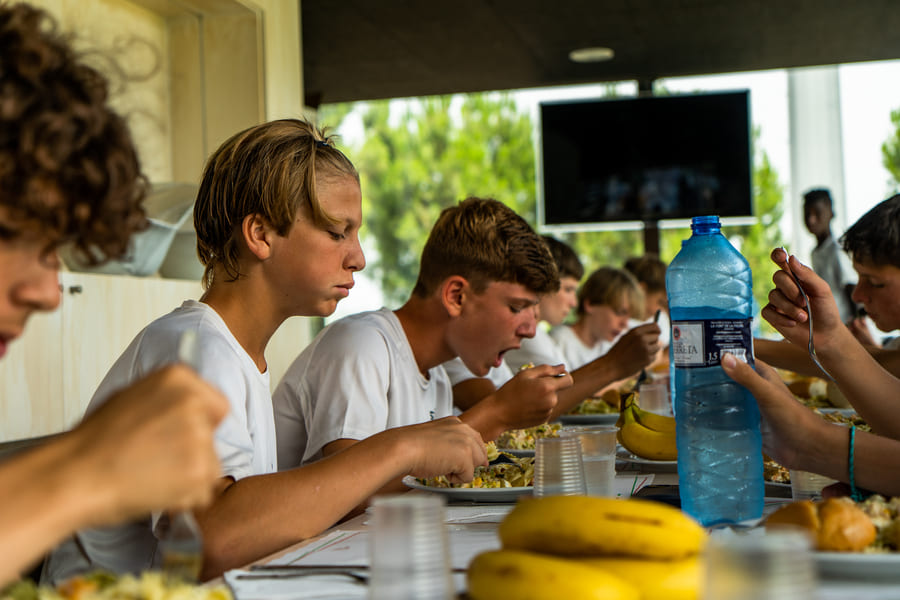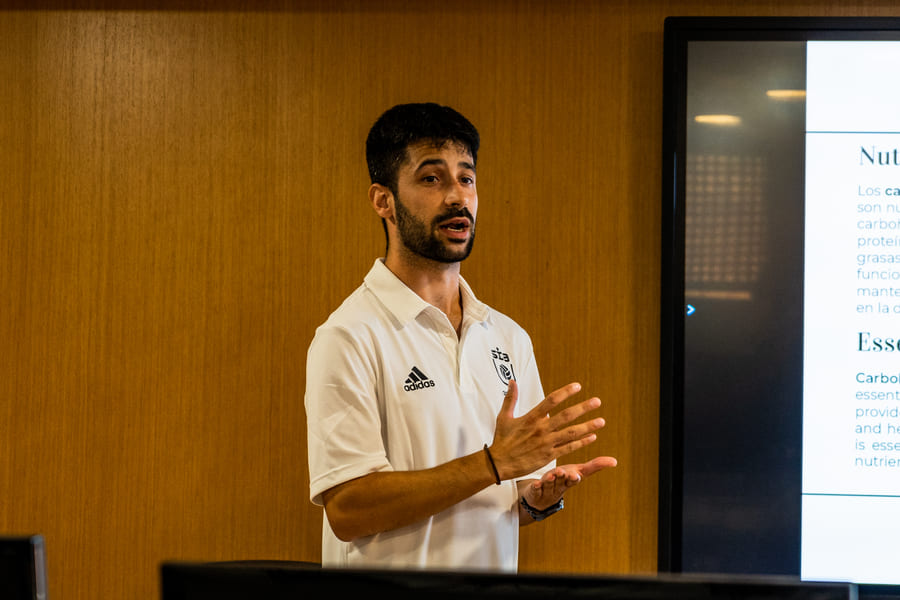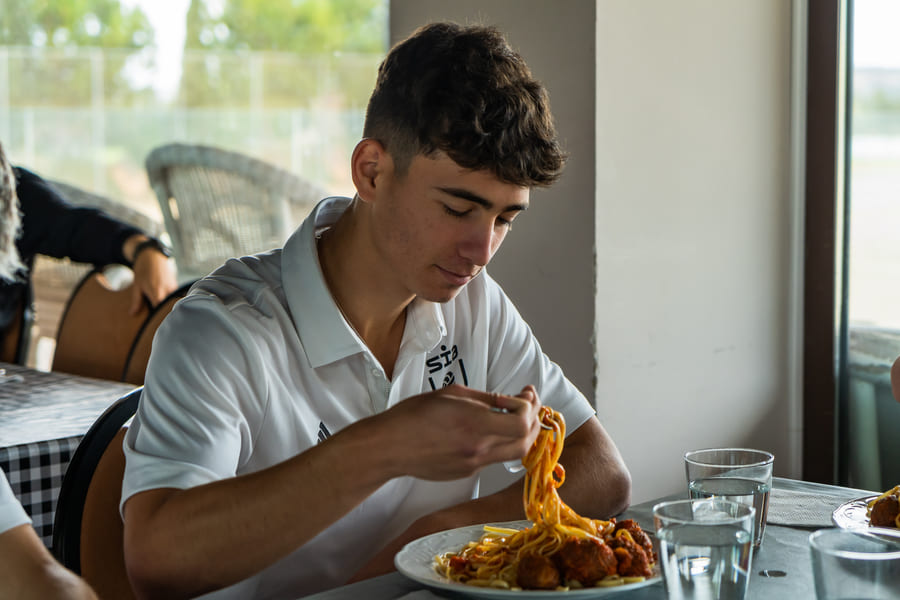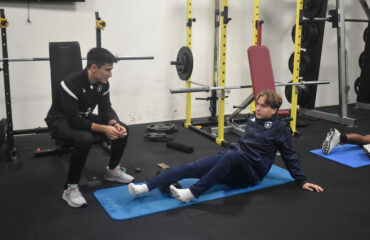Proper nutrition is one of the fundamental pillars for the performance of any athlete, especially for football players in elite academies. In a competitive environment like SIA Academy, where training sessions are intense and matches demand a high physical and mental level, proper nutrition can make the difference between average performance and excellent performance.
During a competition week, the player’s diet must adapt to the demands of training, preparation, and recovery, also adjusting to the day the match takes place. In this article, we will explore how an academy footballer should eat during a competition week, taking into account the nutritional principles that players must follow to maximize their performance and facilitate their recovery, whether the match is on Friday, Saturday, or Sunday.
Table of contents
Diet and its impact on sports performance
Nutrition is essential for a footballer, as it directly influences the energy available during training and on the field. Moreover, proper nutrient intake helps to prevent injuries, aids in muscle recovery, and improves concentration and overall physical condition. This is especially relevant in a high-level football academy like SIA Academy, where players follow a rigorous training schedule combined with frequent competitions. Therefore, young footballers must be aware that a proper diet not only impacts their health but also their performance in every phase of training and competition.
Monday: recovery and initial preparation
Monday, being the first day of the week, is generally a day for the player’s active recovery. After the weekend’s rest, players need to restore energy reserves and repair muscles after the efforts of the previous week. The diet on this day should focus on a good balance of complex carbohydrates (to replenish muscle glycogen), high-quality proteins (for muscle repair), and healthy fats (to maintain the energy system). This day should prepare the body for the more intense training of the following days.

Tuesday and Wednesday: training and physical preparation
On these days, the training sessions are usually more intense and demanding, focusing on technique, tactics, and endurance. During these sessions, nutrition should focus on maintaining a high level of energy to support physical effort, as well as promoting muscle recovery. Carbohydrates should be the foundation of the diet, as they provide the necessary energy for demanding training. Additionally, lean proteins and healthy fats are essential to ensure proper muscle regeneration.
As for snacks, footballers should opt for light but energetic options, such as fruits, protein shakes, or yogurt, which help maintain stable energy levels between sessions.
Thursday: pre-competition preparation
Thursday is a key day to refine tactical and physical details ahead of the match. Depending on when the match is played (Friday, Saturday, or Sunday), this day may involve a reduction in training load. Despite the reduction in intensity, nutrition remains essential, as the body needs to be prepared for the effort the following day.
The diet should include a good amount of slow-release carbohydrates to ensure glycogen stores are full for the match day. Lean proteins should also be consumed to ensure muscle regeneration, without excess that could make the body feel heavy. Meals should be light but nutrient-dense, and hydration is key to ensure the player stays in their best condition.

Friday, Saturday, or Sunday: match day
Match day is the most important day of the week, and nutrition should be entirely focused on optimizing the player’s physical and mental performance. Depending on when the match is played, the nutritional strategy will vary slightly, but in all cases, the focus should be on maximizing available energy without causing a feeling of heaviness.
Breakfast should consist of a source of complex carbohydrates (such as oats or whole-grain bread), high-quality proteins (such as eggs or yogurt), and some healthy fats (avocado or nuts). This will ensure that the player has a sustainable energy source for the match. An overload of fats or overly heavy meals should be avoided to prevent digestive discomfort during the game.
Lunch (if the match is in the afternoon) should be light and focused on quick-absorbing carbohydrates, such as pasta or rice, which will help keep muscle glycogen levels high. It is crucial that the player avoids trying new foods on match day to prevent digestive issues.
During the match, constant hydration is key. Isotonic drinks are an excellent option to replenish lost electrolytes and maintain adequate hydration levels. After the match, the priority should be recovery, consuming a combination of carbohydrates and proteins to restore muscle glycogen and repair muscle damage.
Saturday or Sunday: post-match recovery
The day after the match should focus on recovery. This includes a good intake of carbohydrates to replenish glycogen stores, as well as proteins to repair muscles damaged during physical effort. Hydration remains important, especially after an intense match. The player should consume foods rich in antioxidants (such as fruits and vegetables) to reduce inflammation and promote muscle regeneration.
The diet of an academy player during a competition week must be carefully planned to support performance at each phase of the week. Whether the match is played on Friday, Saturday, or Sunday, the nutritional approach must be adjusted to the demands of training, preparation, and recovery.
In academies like SIA Academy, where players are constantly exposed to physical and mental challenges, proper nutrition is crucial to maximize performance on the field and accelerate recovery after matches. A balanced diet not only provides energy but also reduces the risk of injuries, improves concentration, and helps footballers maintain their best form throughout the season.






